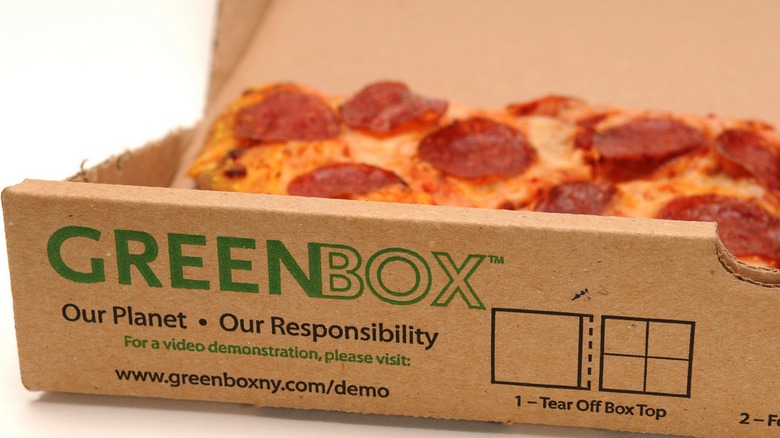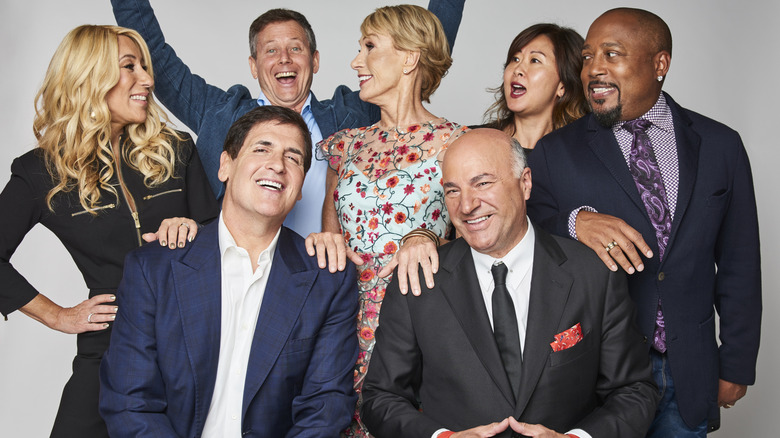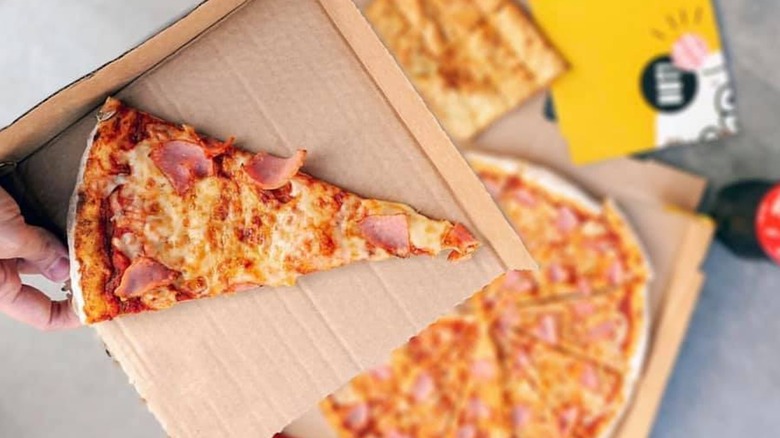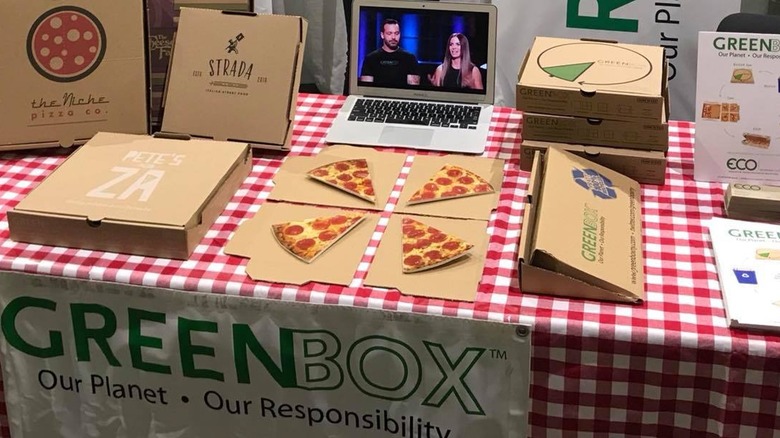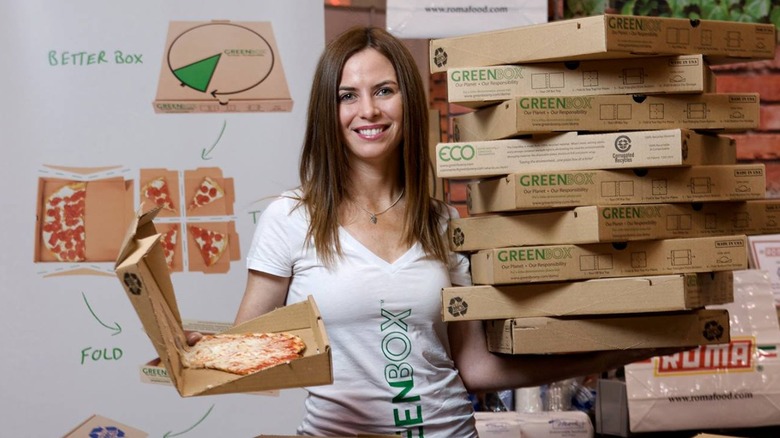Here's What Happened To GreenBox After Shark Tank
As convenient and delicious as takeout pizza is, by its very nature, it creates a lot of waste: napkins, paper plates, those tiny plastic tables, and the box it comes in. The founders of GreenBox aimed to reduce that waste by creating convertible pizza boxes that could be used both as tear-apart paper plates and foldable storage containers for leftovers, while being easily disposable. Even better, they were made of 100% recycled (and recyclable) material.
GreenBox was founded in 2009 when financier-turned-business student Jennifer Wright-Laracy teamed up with the pizza box's creator and patent holder, William Walsh, along with his business partner, Ned Kensing. Walsh came up with the idea of a multifunctional pizza box as a college football player (living amongst other football players), who unsurprisingly ate a whole lot of pizza — and noticed just how cumbersome and wasteful the boxes were.
If this concept sounds familiar, especially to "Shark Tank" fans, it's because the GreenBox co-founders Wright-Laracy and Kensing appeared on the show back in 2015. Sadly Walsh passed away in 2011, before the "Shark Tank" slot, but the inventor had much to do with the brand's early success. In fact, a 2009 YouTube video in which Walsh demonstrates the GreenBox went viral after it was shared on X (formerly Twitter) by actor Ashton Kutcher, racking up millions of views. A few years later, the planet-friendly pizza boxes were even featured on television shows like "The Chew" and "The Rachael Ray Show."
What happened to GreenBox on Shark Tank?
GreenBox and its co-founders Wright-Laracy and Kensing appeared on episode 16 of season 6 of "Shark Tank." Following their initial round of seed funding in 2009, in which the company acquired $50,000 in funds, the founders were seeking a $300,000 investment from the sharks in exchange for a 10% stake in the brand. Wright-Laracy and Kensing were both understandably nervous when introducing themselves to the sharks, and initially flubbed their opening lines, but after some chuckles and a few words of encouragement from the judges, they got through their pitch.
The judges seemed impressed by the multi-use nature of the box. Investor Robert Herjavec called it a "fantastic idea," adding, "I've never seen something so clever for the pizza box." However, the sharks were quick to question the viability of the product in terms of sales. Despite Wright-Laracy telling the sharks that GreenBox had sold over 10 million products, achieving $1.7 million in sales in the past year, the fact that it would cost companies a "fraction of a penny" more per box had the judges concerned, with Marc Cuban pointing out how much that could add up.
Nevertheless, GreenBox received two offers: One for $300,000 and a 10% stake from Kevin O'Leary, and a joint offer from Herjavec and Lori Greiner for the same amount, but a 30% stake. Both were contingent on the company making a deal with a major pizza chain. Ultimately, the founders went with O'Leary.
GreenBox after Shark Tank
Although GreenBox was already working with regional pizza restaurants and big names like Whole Foods before its appearance on "Shark Tank," a partnership with a national pizza chain like Domino's never came to fruition, and therefore, neither did the investment from O'Leary. Still, the publicity the company received from the television slot was invaluable. In an interview with Columbia Business School, her alma mater, Wright-Laracy said, "The level of exposure that 'Shark Tank' has provided GreenBox and the degree of credibility it has added to our product and business have been priceless...The episode has acted as a prime-time commercial that most companies of our size could not possibly afford." She added that their appearance on the program was "a unique selling tool when we reach out to potential new customers and exhibit our products at trade shows. People love 'Shark Tank' and are extremely supportive of products that have been pitched on the show."
Indeed, in 2016, a year after its appearance in the tank, the eco-friendly company made industry headlines when it secured a deal with gas station convenience store giant QuickTrip. As Wright-Laracy was quoted at the time, "We are thrilled that QuikTrip selected the GreenBox to be part of its brand new Carryout X-Large Pizza program...We are honored to be working with one of the top convenience store marketers in the country in terms of product quality and service" (via PMQ). It was definitely a major development for GreenBox.
Is GreenBox still in business?
In 2016, Wright-Laracy told CNBC that GreenBox was operating out of 12 manufacturing locations and the company was growing by about 40% every year. In the years following its "Shark Tank" appearance, the company seemed to be doing quite well; in addition to its big partnership with QuickTrip, it was working with popular pizza establishments like NYC's Skinny Pizza and Neapolitan Express. In 2020, the company revealed that it had been acquired by Pratt Industries, a major player in the corrugated packaging industry. Per the announcement, Pratt had been GreenBox's manufacturing partner for the previous decade, so it sounded like a natural move on both brands' part.
As of 2025, however, the GreenBox website is defunct, and the brand's social media pages on Facebook and Instagram have not been active since 2022, when the company recirculated its acquisition announcement from two years prior. Although Pratt Industries' website does tout the "patented innovation" of GreenBox as one of its unique market solutions, it does not appear to offer the pizza box as one of the customizable offerings available to order on its website. There have been no recent announcements regarding GreenBox's next moves, nor any way to purchase them, so unfortunately it appears the company is no longer in business, or, perhaps, is currently on a hiatus.
What's next for GreenBox's founders?
When GreenBox first shared the news of its acquisition by Pratt Industries, the post confirmed that both co-founder Wright-Laracy and co-owner and account coordinator Lexi Fanning (daughter of the late William Walsh) would be joining the Pratt team to continue working on the eco-friendly pizza box brand in-house. Although things have been quiet on the GreenBox front, Wright-Laracy's LinkedIn profile still lists her as the president of the company. Meanwhile, Fanning's LinkedIn shows that she's been a full-time strategic account specialist at Pratt Industries since 2020. Although co-founder and fellow "Shark Tank" presenter Kensing's future with the company at Pratt was not addressed in the acquisition announcement, his LinkedIn profile still lists him as the vice president of sales. Beyond that, there hasn't been any further updates regarding GreenBox and its founders.
Given that the multi-purpose, waste-reducing pizza box seemed to strike a positive chord with food companies and consumers alike, not to mention its semi-successful dip into the Shark Tank, we're hoping that the brand and its passionate creators are working on a comeback. Perhaps if they finally secure that big national chain deal, they could give shark O'Leary another call. After all, we'd say those convertible packages were the next best thing since sliced pizza — and that's saying something.
